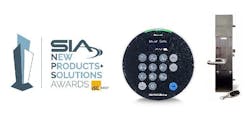Unique Regulations, Restrictions and Challenges of Hospital Integration
Every day, doctors and nurses across the country engage in a battle to save lives. When a patient is in cardiac arrest, doors need to open quickly and reliably and nurses need immediate access to all of the patient’s vital information with just one login. When it comes to integration in a healthcare setting, it’s no exaggeration to say that the stakes can be life or death.
Healthcare integration is often talked about in terms of installing access control and security systems, improving workflow efficiencies, enhancing employee safety and increasing patient satisfaction. But always remember that the most important goal of integration is ultimately to help people, and it’s vital for integrators to understand how best to achieve it.
Although many of your clients may be integrating more than just security, few are as complex or as deep as the needs of a healthcare facility. In this setting, you are likely to integrate security and access control with systems like electronic medical records, nurse call systems, wireless phones and Real Time Locating Systems (RTLS) that automate and track patient movements. And these systems aren’t being used just because they make access control and patient information easier to manage.
“Healthcare has different challenges,” says Scott Myrick, senior sales executive at Pathway Technologies, Inc. in Raleigh and Charlotte, N.C. “The Affordable Care Act ties compensation to patient satisfaction, so hospitals are working hard to raise their scores so that they can get 100 percent compensation.”
An example is RTLS systems that allow a patient to check in at a kiosk and be directed straight to a waiting or exam room. The system then notifies the nurses of the patient’s location and tracks how long the patient waits to receive care. Reduced wait time is one of the biggest factors in patient satisfaction, so integrating these systems makes an impact not just on patient safety and satisfaction, but also on the hospital’s bottom line.
Experts and Experience are Key
Hospitals are reluctant to work with security professionals who don’t have experience in healthcare facilities, so having a staff member who is immersed in healthcare every day is critical to your success. Integrators are expected to be up-to-date on the applicable building, fire, electrical and construction codes that change every year.
By the same token, hospitals don’t expect you to be the expert in everything related to healthcare. For example, the level of detail regarding HIPAA can easily eclipse the knowledge of any integrator. Be willing to bring in experts to ensure the new system complies with the demands of the Affordable Care Act, Joint Commission and HIPAA.
Creating the Best Solutions
Hospitals are known for taking a long time to make their purchase decision, in part because they will maintain the same system for many years and want feel confident that they are choosing a solution that will stand the test of time.
“We encourage our customers to look at who is producing the product, how long that company has been around, and what they offer,” says Mohammed Murad, Vice President, Global Business Development and Sales at IrisID, an Allegion aptiQ Alliance partner. “What is their life cycle of producing new technologies and what happens when they do this? Do they upset the integration or do they integrate smoothly into a legacy system? These are important issues to consider.”
Existing hospitals are continually growing, shifting departments, repurposing space and adjusting their security needs. Open platform security products that will integrate with technology from many companies can also be an attractive solution to healthcare facilities as they provide increased flexibility for future upgrades and expansions.
Murad suggests focusing on two key questions:
- What is the customer really trying to accomplish?
- What is the difference between what the customer desires and what they require?
Listening carefully to customers’ answers to these questions will lead to better intelligence about their true needs. And the better the information you gather, the better solutions you will be able to provide for your customers.
Implementation
Regardless of what solution is ultimately decided on, understand that the actual implementation process is likely to take longer and require more of your hands-on time than other types of projects. Healthcare implementations require an extreme level of detail at every step, extensive plan review, more rework onsite and often more site labor. Even the basics of implementation are different because you are working in a 24-hour environment and must accommodate the needs of patients and staff in most areas.
As a result, a hospital job can require two to three times more labor cost than a typical construction project, and while it’s relatively easy to estimate the cost of goods, integrators inexperienced in healthcare can easily lose money on labor and overhead – the two things hospitals are going to gobble up.
To avoid costly mistakes in project budgeting, and to learn the unique requirements of healthcare integration, Myrick recommends starting out small. Senior living or assisted living facilities can give you an opportunity to integrate access control with patient wandering systems, without the complexity of an enterprise-wide RTLS system. Medical office buildings can also help you learn what and how to estimate. Small remodeling projects or a service business can give you an opportunity to get in, make repairs and get out, as well as a chance to get to know some of the stakeholders, and test your own systems and abilities to handle healthcare calls.
Opportunities for Growth
Healthcare is one of the fastest growing vertical markets for integration. Experts predict that while there are about 600 to 1,000 healthcare systems across the country today, mergers and acquisitions over the next ten years could reduce that number to 250. It’s easy to see the opportunity for integration as these organizations join forces both physically and figuratively.
These facilities also offer the ultimate opportunity for ongoing service and maintenance. Once you have an established relationship, healthcare clients tend to stay with you, giving you ongoing capital projects, constant rebuilding and month-to-month maintenance.
But it’s the intangible reward that makes healthcare a great opportunity, according to Myrick. “If you’re looking for the quick sale, it’s just not going to be in healthcare,” he says. “It’s a longer pull-through, but there’s more to it than the system – it’s about helping people. That’s the real return on investment.”
Minu Youngkin is the Integrator Marketing Manager for Allegion. For more information, visit allegion.com.






